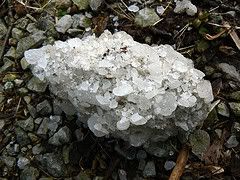 The Food and Drug Administration has received a call to begin a study concerning whether it should regulate or limit the amount of sodium that food items contain. Advisory groups, including the American Medical Association, think that the study, and any bad credit installment loans needed to conduct it, would be worth it. Sodium is implicated as being far too present within the American diet. Sodium is known to raise blood pressure, which can lead to heart disease, the number one killer within the US.
The Food and Drug Administration has received a call to begin a study concerning whether it should regulate or limit the amount of sodium that food items contain. Advisory groups, including the American Medical Association, think that the study, and any bad credit installment loans needed to conduct it, would be worth it. Sodium is implicated as being far too present within the American diet. Sodium is known to raise blood pressure, which can lead to heart disease, the number one killer within the US.
An FDA Sodium study would take a while
FDA trials can take a long time. Sodium is a vital part of nutrition in the proper amounts. A division of the National Academy of Sciences, the Institute of Medicine, has requested the FDA regulate the amount of sodium in food. A recent report published by the Institute of Medicine found Americans have too much sodium in their diets. The study was initiated by a Congressional request in 2008.
Sodium is vital in proper proportion
The maintaining and regulation of bodily fluids, from the Health Canada page, demands a certain intake of sodium each day. However, too much sodium results in higher blood pressure, which leads to hypertension and heart disease, the number one killer among U.S. adults. Ordinary salt is fingered as the biggest source of sodium within the IOM brief.
Unhealthy foods often contain more than enough salt
Unhealthy foods, such as many fried foods, pizza, and many processed and preserved food items, which are over consumed by Americans, have high salt content. The American Medical Association has asserted, according to USA Today, that if restaurants and other food companies were to cut back sodium content by half over the next 10 years, about 150,000 fewer individuals would die as a result. The IOM states that normal intake is 3,400 milligrams daily, over twice the recommended 1,500 milligrams.
In the US the number one killer is heart disease
Heart disease kills a lot more Americans than anything else. It has long been suspected that it is tied to our diet. The insurance of Croesus and cash advances couldn’t cover a heart transplant, and sodium is a known reason for high blood pressure which leads to heart disease. If there is possibly merit to limiting sodium levels, possibly it is worth looking into.
Article Sources
http://www.iom.edu/Reports/2010/Strategies-to-Reduce-Sodium-Intake-in-the-United-States/Report-Brief-Strategies-to-Reduce-Sodium-Intake-in-the-United-States.aspx
http://www.hc-sc.gc.ca/hl-vs/iyh-vsv/food-aliment/sodium-eng.php
http://www.usatoday.com/news/health/2010-04-20-fda-salt-cutback_N.htm
No comments:
Post a Comment